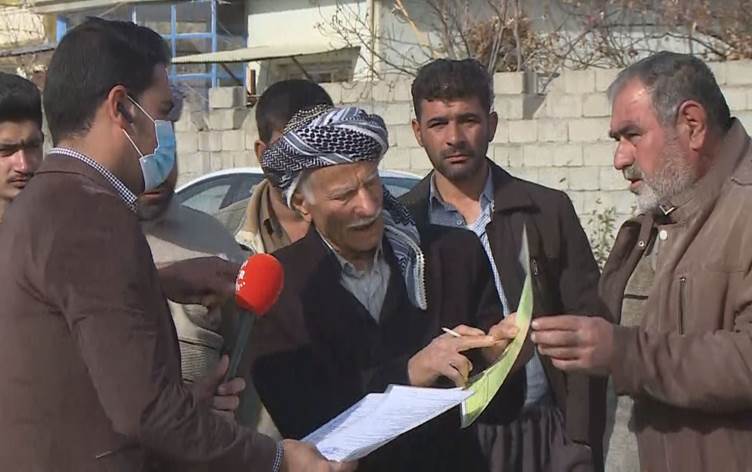Iraq


Farmers in the village of Galozi in Kirkuk province speak to Rudaw on December 29, 2020. Photo: Rudaw
ERBIL, Kurdistan Region — Kurdish farmers speaking to Rudaw alleged on Tuesday that a patrolling unit from the Iraqi Army forced them to leave their farms in the Kirkuk province village of Galozi.
“They came to me and asked why I was farming there. They said that it belongs to the finance [ministry],” said one farmer, adding that he was threatened with detention if he did not leave his farm.
The Kirkuk province villages of Palkana and Haftaghar have been the recent focal points of tension over land ownership between Kurds and Arabs.
Several villagers told Rudaw that the order to leave their farmland in Galozi was unexpected because the village has been free from ethnic tensions for a long time.
Another villager said that their trucks loaded with agricultural equipment had passed through Iraqi Army’s checkpoints in recent days without any issues.
The villagers said that the force consisted of one vehicle and three soldiers.
Villagers spoke to Rebwar Taha, a Kurdish member of Iraqi parliament on the phone to ask for his help as a member of a parliamentary committee established recently to settle the land ownership issues.
Taha told Rudaw that he has spoken with Saad Harbiya, head of Kirkuk Operations Command, who “seemed to be surprised to hear the news.” Harbiya had told him that he used to serve as a top commander in the area and did not see any ethnic issues there, he said.
Taha said the expulsions could perhaps be explained by “individual behaviour” by some Iraqi Army soldiers, and said that the farmers should now be able to their farmland without issue.
The Iraqi parliamentary committee, consisting of 11 members – five Kurds, four Arabs and two Turkmen – visited Kirkuk on Monday, meeting with local officials and commanders.
They also met with Kurdish farmers and those Arabs who have claimed the lands. Each of them submitted documents with the aim of proving land ownership.
Additional reporting by Hardi Mohammed
“They came to me and asked why I was farming there. They said that it belongs to the finance [ministry],” said one farmer, adding that he was threatened with detention if he did not leave his farm.
The Kirkuk province villages of Palkana and Haftaghar have been the recent focal points of tension over land ownership between Kurds and Arabs.
Several villagers told Rudaw that the order to leave their farmland in Galozi was unexpected because the village has been free from ethnic tensions for a long time.
Another villager said that their trucks loaded with agricultural equipment had passed through Iraqi Army’s checkpoints in recent days without any issues.
The villagers said that the force consisted of one vehicle and three soldiers.
Villagers spoke to Rebwar Taha, a Kurdish member of Iraqi parliament on the phone to ask for his help as a member of a parliamentary committee established recently to settle the land ownership issues.
Taha told Rudaw that he has spoken with Saad Harbiya, head of Kirkuk Operations Command, who “seemed to be surprised to hear the news.” Harbiya had told him that he used to serve as a top commander in the area and did not see any ethnic issues there, he said.
Taha said the expulsions could perhaps be explained by “individual behaviour” by some Iraqi Army soldiers, and said that the farmers should now be able to their farmland without issue.
The Iraqi parliamentary committee, consisting of 11 members – five Kurds, four Arabs and two Turkmen – visited Kirkuk on Monday, meeting with local officials and commanders.
They also met with Kurdish farmers and those Arabs who have claimed the lands. Each of them submitted documents with the aim of proving land ownership.
Additional reporting by Hardi Mohammed









Comments
Rudaw moderates all comments submitted on our website. We welcome comments which are relevant to the article and encourage further discussion about the issues that matter to you. We also welcome constructive criticism about Rudaw.
To be approved for publication, however, your comments must meet our community guidelines.
We will not tolerate the following: profanity, threats, personal attacks, vulgarity, abuse (such as sexism, racism, homophobia or xenophobia), or commercial or personal promotion.
Comments that do not meet our guidelines will be rejected. Comments are not edited – they are either approved or rejected.
Post a comment